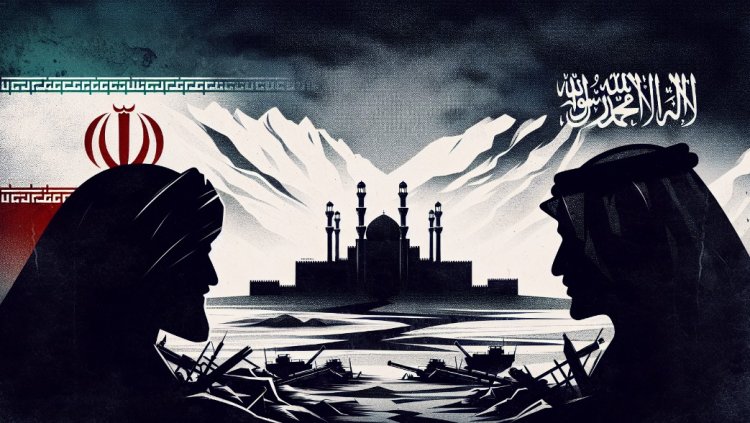The Bitter Rivalry Between Iran and Saudi Arabia: A Journey through War-Torn Region
Delve into the complex and volatile relationship between Iran and Saudi Arabia, two regional powerhouses locked in a bitter rivalry that shapes the Middle East. Explore their historical tensions, religious differences, proxy wars, and the impact on a war-torn region.

Introduction
-
The war-torn region between Iran and Saudi Arabia has been a dangerous hotspot of conflict in recent years.
-
Both sides have been unwilling to back down, resulting in a prolonged and devastating regional war.
-
Saudi Arabia accuses Iran of being a hostile and adventurous nation, attempting to export revolution throughout the region.
-
Iran, on the other hand, denies these accusations and claims that Saudi Arabia is the one supporting extremism and exporting terrorism.
The roots of the divide
-
The Iranian Shia Revolution in 1979 ignited a fire that has fueled the bitter rivalry between Iran and Saudi Arabia.
-
Ayatollah Khomeini's revolutionary ideology rejected monarchy and sought to export his revolution throughout the region.
-
Iran has a history of exploitation and abuse by the West, leading to a deep mistrust and desire for independence.
Exploration of the Iranian Shia Revolution and its impact on Saudi Arabia
In 1979, something important happened in Iran called the Shia Revolution. This event changed things a lot in the area and caused a big problem between Iran and Saudi Arabia. They have been fighting and not getting along since then. There was a man named Ayatollah Khomeini who led a big change in Iran. Before, Iran had a king, but Khomeini and his followers didn't like that. They desired that Iran would adhere to the Shia religion and be under religious rule. They didn't like how the United States supported the king, so they got rid of him and made Iran into an Islamic Republic. This change in power made the people in charge worried and made Saudi Arabia feel like they might not be the most important country for Muslims anymore.
Discussion on Khomeini's revolutionary ideology and the rejection of monarchy
Ayatollah Khomeini had a different way of thinking about how a country should be run. He didn't believe in having a king or queen in charge. Instead, he thought that religious scholars should be the leaders and make the important decisions. His ideas were based on the Shia branch of Islam. Khomeini thought that the leaders of the Gulf countries, like Saudi Arabia, were similar to the Shah of Iran. He believed that these leaders needed to be removed from power. This strong desire for change and refusal to accept a king as a leader went against the belief that Saudi Arabia was the rightful and important leader in the Muslim world.
An overview of the historical exploitation and abuse of Iran by the West
For a very long time, Western nations—particularly Britain and the United States—have mistreated and taken advantage of Iran. The people in Western countries needed a lot of oil to power their homes and cars. They got a lot of this oil from Iran, but sometimes this caused problems for the people in Iran. Back in 1953, some people from the CIA and British spies worked together to do something sneaky. They desired to remove Mohammad Mossadegh, the elected Prime Minister, from office. They did this because he made a decision to take control of the country's oil industry. This action made the lack of trust between Iran and Western countries even worse and made the people in Iran feel even more negative towards Western countries.
The Rise of Hezbollah and Iranian Influence
-
An explanation of the relationship between Iran and Hezbollah
-
Overview of Iran's support for Hezbollah and the establishment of its ideology
-
Discussion on the impact of the Iran-Iraq war and the role of Hezbollah
Hezbollah is a very strong group in Lebanon that does both political and military stuff. They are known for being connected to Iran and having a lot of influence in the area. The connection between Iran and Hezbollah is quite complicated. It goes back a long time and is based on their similar beliefs and ideas. Iran has given a lot of help to Hezbollah. They have given them money and weapons, which has helped Hezbollah become very powerful and important in the Middle East.
An explanation of the relationship between Iran and Hezbollah
Hezbollah is a group that started in the early 1980s because they were upset about Israel coming into Lebanon. They wanted to do something about it. But it didn't take long to realize that Iran was very important in creating and growing the organization. Hezbollah and Iran are like close friends because they have similar beliefs in their religion, which is called Shia Islam. Both of them don't like Israel, and they both want to make their own Islamic revolution happen in the area around them.
Overview of Iran's support for Hezbollah and the establishment of its ideology
Iran has given a lot of help to Hezbollah in many different ways. Iran has given a lot of money, weapons, and teaching to the people who fight for Hezbollah. This has helped Hezbollah build a strong army and political system, making them a big power in Lebanon and the surrounding area. Furthermore, the way Iran thinks and believes in things, which is based on Shia Islam, has had a big impact on how Hezbollah thinks and believes in things too.
Discussion on the impact of the Iran-Iraq war and the role of Hezbollah
There was a big fight between Iran and Iraq that went on for a long time, from 1980 to 1988. This fight had a big effect on both Iran and a group called Hezbollah. Saddam Hussein from Iraq was attacking Iran at a time when there was a significant conflict known as a war. But there was a group called Hezbollah that helped Iran a lot and gave them very important support. This helped Hezbollah become more important in the area and gave them useful knowledge about fighting in wars. The war made Iran and Hezbollah closer friends because they fought together against a shared enemy.
The Role of Saudi Arabia and its Response
-
Analysis of Saudi Arabia's role in the region and its response to Iranian influence
-
Overview of Saudi Arabia's support for Iraq during the Iran-Iraq war
-
Discussion on the influence of Wahhabi ideology and Saudi funding of religious schools
Saudi Arabia has been involved in a big way in the ongoing fight between Iran and Saudi Arabia. The country has been doing things to counteract what it thinks is Iran's influence in the area. Saudi Arabia is saying that Iran is a country that is unfriendly and likes to take risks. They believe that Iran is trying to spread their ideas and cause trouble in other countries nearby. But Iran says they didn't do those bad things, and instead, they think Saudi Arabia is the one doing bad things by supporting extremism and spreading terrorism.
In the old days, there was a big fight between Iran and Iraq that lasted for a long time, from 1980 to 1988. During this fight, a country called Saudi Arabia helped Iraq a lot. They gave them a lot of support and help. The Saudi government saw Iraq as a very important friend in their efforts to stop Iran from having too much power in the area. This help involved giving money, guns, and help with talking to other countries. Saudi Arabia helped Iraq a lot during the war, and this made the situation between Iran and Saudi Arabia even worse.
Saudi Arabia is doing something important to counter the influence of Iran. They are spreading a particular belief system called Wahhabi ideology. Wahhabism is a type of Islam that is very strict and wants to make the religion pure by getting rid of things they think are bad and going back to exactly what the religious texts say. Saudi Arabia has given money to religious schools called madrassas. These schools teach a particular set of beliefs or ideas. These schools have played a big role in spreading Wahhabi teachings, not just in Saudi Arabia but also in other places around the world.
The Influence of Wahhabi Ideology
The Wahhabi ideology has made a big difference in how extremist groups have grown and how radical ideas have spread. The strict way of understanding Islam that Wahhabism teaches has created a place where extreme ideas can grow. This has helped groups like Al Qaeda and ISIS become more powerful. The Saudi government giving money to religious schools has made some people become radical and believe in extreme ideas.
The Saudi government has been getting negative comments because it helps religious schools that teach a very strict way of following Islam and make people believe in extreme ideas. Some people say that this help has made terrorism and fighting between different religious groups increase all around the world. But Saudi Arabia has been doing things lately to deal with these worries and has been trying to fight against extreme beliefs and encourage a more reasonable kind of Islam.
To put it simply, Saudi Arabia has done important things to deal with the influence of Iran in the area. Saudi Arabia helped Iraq during a war with Iran. They also spread a certain type of religious belief called Wahhabi. These things have influenced the ongoing conflict between Iran and Saudi Arabia. The Wahhabi teachings have had a big impact on many things. They have helped extremist groups become more powerful and have made radical ideas spread more widely. Saudi Arabia has been criticised for supporting extreme ideas, but they are trying to fix this by doing things to show that they support a more reasonable kind of Islam.
The Impact on the Region
-
Analysis of the impact of the Iran-Saudi Arabia rivalry on the Middle East
-
Discussion on the proxy wars, sectarianism, and the destruction of the region
-
Overview of the civilian casualties and the suffering of countries like Syria, Iraq, and Yemen
There is a very strong dislike for and competition between Iran and Saudi Arabia, and this has caused a lot of problems in the Middle East. These problems have been really bad and have caused a lot of harm to the area. These two powerful groups have been fighting each other, but instead of fighting directly, they fight through other groups. This has caused a lot of fighting between different religious groups and has led to the destruction of whole countries.
Analysis of the impact of the Iran-Saudi Arabia rivalry on the Middle East
The fighting between Iran and Saudi Arabia has caused a lot of problems for the Middle East. These two big areas have been trying to be the boss and have control over each other, which has made things more tense and caused fights to happen. The fight for control has caused battles to happen in other places and has made people from different religious groups not get along, making the area even more unstable.
Discussion on the proxy wars, sectarianism, and the destruction of the region
One big result of the Iran-Saudi Arabia fight is that there have been many wars happening in the Middle East, but instead of the countries fighting directly, they use other groups to fight for them. Both countries have helped different groups with weapons, making the fighting worse in places like Syria, Iraq, and Yemen. This has caused a lot of damage, made many people move away from their homes, and caused the deaths of people who didn't do anything wrong.
Overview of the civilian casualties and the suffering of countries like Syria, Iraq, and Yemen
The fighting between Iran and Saudi Arabia has caused a lot of harm to countries like Syria, Iraq, and Yemen. It has been really bad for them. These countries have experienced the worst effects of the fights caused by the competition between other countries. This has led to a lot of innocent people getting hurt or killed, and a lot of people are suffering a great deal. The fighting in these places has caused big problems for the people living there. Many people are suffering and really need help.
Conclusion
-
Reflection on historical events and their influence on the current situation
-
An overview of the continued tensions between Iran and Saudi Arabia
-
Final thoughts on the need for resolution and the impact on the region
When we think about the things that happened in the past that have made Iran and Saudi Arabia not like each other, we can see that these bad feelings have been around for a long time. In 1979, something important happened in Iran called the Shia Revolution. This event changed things a lot in the area and made Iran and Saudi Arabia enemies. They have been fighting and not getting along ever since. The revolution led by Ayatollah Khomeini made Saudi Arabia worried about its position as the leader of the Muslim world. It also made them concerned about the way things were organised in the region.
Ever since that time, Iran and Saudi Arabia have been fighting each other to be the most powerful and influential countries in the Middle East. These two big areas have been fighting each other, but not directly. Instead, they fight through other smaller groups. This fighting has caused divisions between different religious groups and has led to the complete destruction of some countries. This fight between two groups has caused a lot of harm in the area. Many innocent people have been hurt or killed, and countries like Syria, Iraq, and Yemen have been going through a lot of pain and difficulty because of it.
It means that there is a big problem in the area, and people really need to find a way to solve it and make things calmer. The ongoing problems between Iran and Saudi Arabia have made conflicts worse and caused more disagreements. The situation in the area is really, really bad. Lots of people who didn't do anything wrong are having a really hard time because of these fights that keep happening.
To make things calm and steady in the Middle East, it's really important for Iran and Saudi Arabia to figure out how to fix their problems and start getting along better. The people from different countries need to help each other talk and solve problems peacefully so that everyone can feel safe and the region can be peaceful.
In simple terms, what happens between Iran and Saudi Arabia will have a big impact on the whole area around them. It's not just up to Iran and Saudi Arabia's governments, but also the whole world, to try to find a peaceful solution and make things better for the innocent people in the Middle East affected by their rivalry.



 admin
admin 










